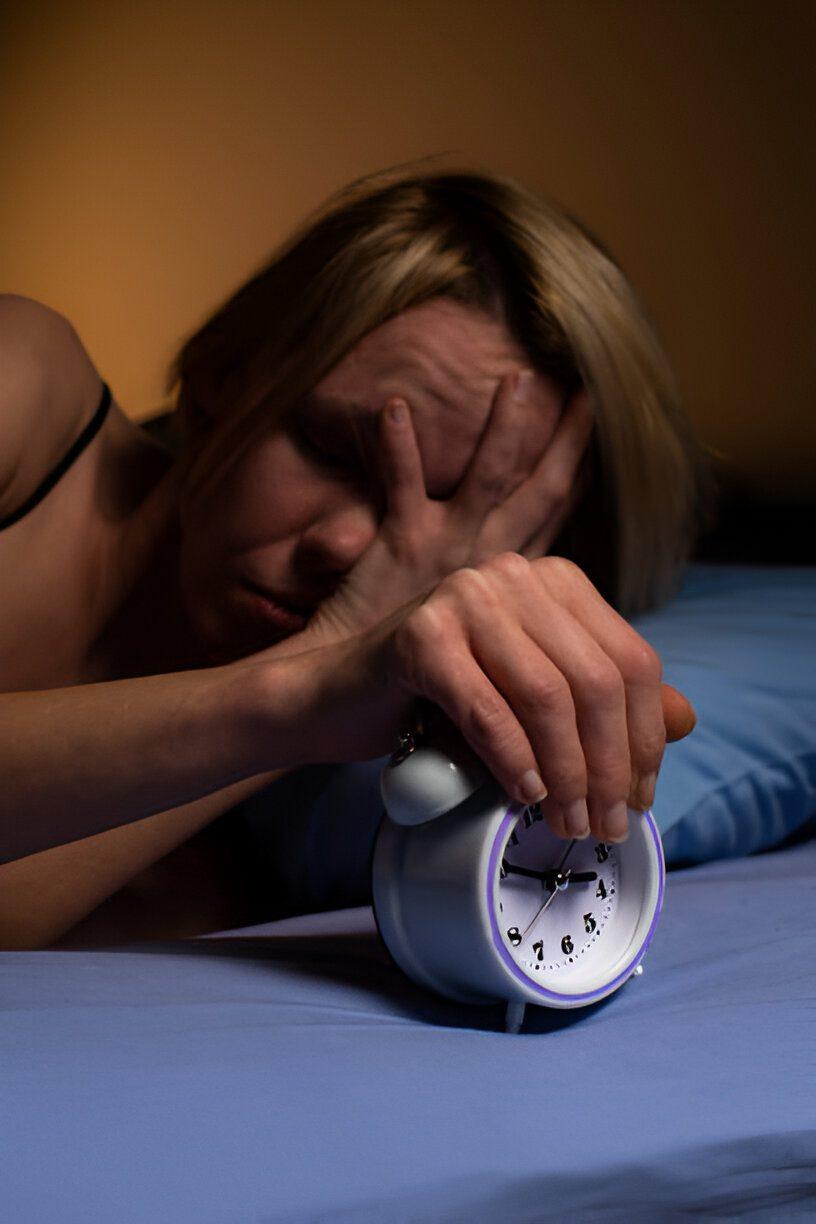When Grief and Sleep FIght
Grief and sleep share a complicated relationship. After a loss, exhaustion often sets in—yet, frustratingly, sleep remains elusive. It’s a cruel paradox: the body and mind crave rest, but as soon as the lights go out, thoughts race, emotions surge, and the night stretches endlessly.
If you’ve found yourself wide awake at 3 AM—replaying memories, questioning “what ifs,” or feeling a gnawing emptiness—know this: you’re not alone. Grief-induced insomnia is one of the most common, yet least acknowledged, struggles of mourning. But why does loss disturb sleep so deeply? And how can you reclaim the restful nights you so desperately need?
Nighttime Echoes: Confronting the Sleeplessness of Mourning

Grief isn’t just emotional—
It’s a full-body stress response. When we lose someone we love, the body perceives it like a threat, flooding our systems with hormones and neurological signals that hinder rest. This results in a cruel paradox: even when our hearts are exhausted, our minds can’t switch off. Understanding the biological underpinnings of grief-induced insomnia can empower us to break the cycle of restless nights—helping body and spirit to heal.
The Science Behind Grief-Related Insomnia
Grief is more than an emotional experience—
it’s a physiological event. When love and connection are abruptly taken away, the body struggles to process the “threat” that sorrow brings.
1. The Body in Fight-or-Flight Mode
Grief activates the sympathetic nervous system, mirroring how we respond to danger—only in this case, the wound is internal, intangible.
🔹 Cortisol Surge: Stress hormone levels skyrocket, keeping the body on high alert—like an engine stuck in overdrive.
🔹 Melatonin Disruption: Cortisol suppresses the sleep-regulating hormone melatonin, leading to erratic rest.
🔹 Restlessness & Racing Thoughts: With the nervous system “on,” the mind replays regrets, unspoken words, or painful memories in an endless loop.
🎭 Analogy: Picture trying to sleep while a fire alarm screams overhead—grief is that piercing alarm, preventing your brain from powering down.
How Grief-Related Insomnia Manifests
It’s not always just trouble falling asleep; sometimes grief reshapes the entire structure of your nights:
- ✅ Difficulty Falling Asleep: Thoughts and emotions grow louder after dark.
- ✅ Frequent Night Wakings: Sleep becomes shallow and fragmented, sometimes haunted by uneasy dreams.
- ✅ Early Morning Waking: Dawn breaks and the mind can’t settle back into slumber.
- ✅ Vivid Dreams or Nightmares: The subconscious processes grief through intense, sometimes unsettling imagery.
- ✅ Daytime Exhaustion: Without deep sleep, fatigue, irritability, and brain fog accumulate.
📝 Personal Reflection:
A grieving mother once shared feeling like she lived two existences—daytime composure and nighttime turmoil, describing it as “my grief waits for me in the dark.”
Why Grief and Insomnia Feed Each Other
Grief causes insomnia, but insomnia intensifies grief—a vicious cycle unfolds:
- 🔹 Lack of Sleep → Weak Emotional Regulation: Exhaustion magnifies sadness, anxiety, and mood swings.
- 🔹 Exhaustion → Harder Daily Functioning: Energy drains, leaving everyday tasks overwhelming.
- 🔹 Stress Over Not Sleeping → Heightened Anxiety: The more you chase sleep, the more elusive it becomes.
🎭 Analogy: It’s like trying to extinguish a fire while constantly adding fuel—the more you battle insomnia, the stronger it flares.
“I felt like I lived two lives—one by day, holding myself together, and one by night, when grief wouldn’t let me rest. It’s like my sorrow waits for me in the dark.”
— Rachel Sorens
How to Fix Grief-Induced Insomnia
Regaining sleep after a loss involves emotional care, lifestyle tweaks, and better sleep hygiene.
1. Create a Sleep Routine That Supports Healing
- 🔹 Set a Consistent Sleep Schedule: Bedtime and wake-up at the same times daily (weekends included).
- 🔹 Wind-Down Routine: Gentle reading, calming music, or deep breathing help the mind shift from grief to rest.
- 🔹 Limit Screen Time: Avoid blue light at least an hour before bed—it hinders melatonin.
- 🔹 Bedroom as Sanctuary: Cool, dark, and quiet signals the brain it’s safe to relax.
2. Manage Nighttime Anxiety and Overthinking
- 🔹 Journal by Your Bedside: Offload racing thoughts onto paper before switching off the light.
- 🔹 4-7-8 Breathing Technique: Inhale 4s, hold 7s, exhale 8s—activates the body’s relaxation response.
- 🔹 Guided Meditation or Sleep Hypnosis: Grief-specific audio can gently redirect your mind.
📝 Personal Reflection:
A friend who battled grief-induced insomnia found solace writing letters to her late husband each evening. “I tell him everything I wish I could have said,” she noted, “and only then can I finally sleep.”
3. Regulate Stress Hormones During the Day
- 🔹 Gentle Movement: Walks, yoga, or stretching ease cortisol buildup.
- 🔹 Get Morning Sunlight: Natural daylight stabilizes circadian rhythms.
- 🔹 Sleep-Supporting Foods: Magnesium and tryptophan (in almonds, bananas, turkey) boost melatonin production.
4. Address Emotional Aspects of Grief
- 🔹 Talk About Your Loss: Therapy, grief support, or honest chats help process feelings before they emerge at bedtime.
- 🔹 Write a Letter to Your Loved One: Express unsaid words for emotional release.
- 🔹 Practice a Grief Ritual: Light a candle, reflect on photos, or note shared memories—providing comfort and closure.
5. When to Seek Professional Help
If insomnia lingers over a month or severely impacts daily life:
- 🔹 Grief Therapist: Specialized support can help untangle complex, unresolved sorrow.
- 🔹 Sleep Specialist: Chronic insomnia may need targeted interventions, from CBT for insomnia to short-term meds.
- 🔹 Doctor: Natural or temporary medicinal aids might reset broken sleep patterns.
Things To Try This Week
Establish a Bedtime Journaling Habit
-
- Spend five minutes writing any lingering worries or regrets. Seeing them on paper can free your mind to rest.
Gentle Evening Movement
-
- A short walk or mild yoga session lowers tension and cortisol, easing the mind for bedtime.
Create a “No-Screen Hour”
-
- Power down devices 60 minutes before lights out—allow your eyes and brain to disengage from digital overstimulation.
Conclusion
Sleep Is Part of the Healing Process
Grief doesn’t just hurt your heart—it disturbs the body, brain, and most critically, your rest. Insomnia may seem inescapable, but with proper adjustments—routine-building, stress management, and emotional expression—peaceful sleep can return.
Loss is exhausting, but you don’t need to remain trapped in sleepless fatigue. By soothing your overactive nervous system and confronting unspoken sorrow, you can break the cycle of wakeful nights and let your body achieve the deep rest it craves to mend.
🎭 Final Analogy: Think of sleep as emotional housekeeping for the brain—just as you wouldn’t leave a house cluttered indefinitely, prioritizing rest enables you to process grief without being wholly consumed.
You’re not alone in this battle. Healing emerges in sleep, and given patience, time, and care, restful nights will return.
When grief robs you of sleep, comfort and support become essential. Each small step—whether journaling, mindful breathing, or a simple nighttime ritual—helps you reclaim the restful hours your mind and body so desperately need.
Browse our cherish collections below for calming tools, supportive keepsakes, and empathetic community connections, reminding you that amidst sorrow’s late-night vigil, a gentle path back to rest awaits.
More Reflections, More Growth
Loss is complex, and the road to healing is different for everyone. These reflections offer insight, support, and guidance as you navigate this journey.
When Grief Weighs on Mind, Body, and Spirit: Understanding the Silent Toll of Loss
Grief touches every part of us—the mind, body, and spirit. From cognitive fog to broken heart syndrome, this guide explores the full spectrum of grief’s effects and offers insights into how we can heal and carry the weight of our loss.
Debunking the “Time Heals All Wounds” Myth: Transforming Grief Through Active Healing
Grief doesn’t fade with time—it requires active participation and healing. Learn why “time heals all wounds” is a myth and how engaging in grief through expression, ritual, and support can lead to true emotional recovery.
The Link Between Grief and Heart Problems: Why Loss Can Literally Break Your Heart
Grief doesn’t just affect the heart emotionally—it has real physical consequences on cardiovascular health. Learn about the link between grief and heart problems, including Broken Heart Syndrome, and discover how to protect your heart during mourning.
Grief and Weight Changes: Why You Might Lose or Gain Weight After a Loss
Grief can lead to significant weight changes, whether through appetite loss or emotional eating. This page explains the science behind grief-related weight fluctuations and offers guidance on how to manage these changes during the healing process.
Why Does Grief Make You Feel Sick? The Science Behind Grief’s Impact on Your Body
Grief isn’t just emotional—it’s physical. While many expect to feel sadness or mental fatigue after losing someone significant, fewer anticipate the profound bodily aches, exhaustion, and even flu-like symptoms that grief can trigger. By disrupting...
Healing After Heartbreak: Understanding the Link Between Grief and Heart Disease
Grief can have a significant impact on your heart health, leading to conditions like Broken Heart Syndrome. This article explains the link between emotional distress and heart disease and offers tips for protecting your heart while navigating the difficult journey of grief.
Chronic Illness and the Grief That Follows: Learning to Accept a New Normal
Chronic illness creates an ongoing form of grief as individuals navigate the loss of their former life. This article explores the emotional toll, coping strategies, and the path to acceptance and a new normal in the face of illness.
When the Mind Mourns: Navigating Grief After an Alzheimer’s Diagnosis
A diagnosis of Alzheimer’s triggers anticipatory grief and emotional loss. This article offers guidance for coping with the sorrow of seeing a loved one’s personality fade and maintaining meaningful connections through Alzheimer’s care.
Holding Onto Hope: Coping with the Emotional Toll of a Cancer Diagnosis
A cancer diagnosis brings overwhelming emotions—fear, sadness, and anger. Learn how to cope with the emotional toll of cancer, find resilience, and hold onto hope during this challenging journey.
Explore Journeys of Healing and Solace:
Discover dedicated spaces that offer understanding, guidance, and connection through grief. From the loss of loved ones to life’s challenging transitions, each category provides a pathway to reflect, connect, and find peace in shared experiences.


























